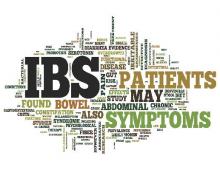Adults with irritable bowel syndrome (IBS) who underwent psychotherapy improved more than about 75% of controls, and the effect “remained significant and medium in magnitude” for at least 6-12 months, according to a meta-analysis of 41 randomized, controlled trials reported in the July issue of Clinical Gastroenterology and Hepatology.
The finding “is particularly noteworthy because of the typically recurrent, persistent nature of IBS symptoms,” said Kelsey Laird, a doctoral student of clinical psychology at Vanderbilt University in Nashville, Tenn., together with her associates there. “Future research is needed to compare the longevity of treatment effects for psychotherapy with pharmacologic therapies, such as antidepressants,” they added. “Although it is beyond the scope of this review, it is also important to consider the mechanisms by which psychotherapies improve GI symptoms and to determine the ‘active ingredients’ responsible for this effect.”
Up to 16% of individuals in the United States have IBS, and treating it costs anywhere from $950 million to $1.35 billion per year, the researchers noted. Other meta-analyses found psychotherapy about as effective as antidepressants for treating IBS-related GI symptoms over the short term, but its long-term efficacy was unknown, they added. Therefore, they searched PubMed, PsycINFO, Science Direct, and ProQuest through Aug. 15, 2015, identifying randomized controlled trials of psychological therapy and active or nonactive comparators. Psychotherapy included not only traditional psychodynamic and cognitive-behavioral therapies, but also mind-body approaches, such as relaxation training, biofeedback, and yoga, “which can be conceptualized as mindful movement,” Ms. Laird and her associates said. Comparators included support groups, education, sham treatments for hypnosis or biofeedback, online discussion forums, enhanced medical care, treatment as usual, symptom monitoring, and being wait-listed for psychological treatment (Clin Gastroenterol Hepatol. 2016 Jan 21. doi: 10.1016/j.cgh.2015.11.020). The 41 trials included 2,290 patients, comprising 1,183 assigned to the psychological modalities and 1,107 assigned to the various comparators. Taken together, the psychological modalities were associated with greater improvements in GI symptoms immediately after treatment, as compared with the grouped comparators. The Cohen’s d value was 0.69 (95% confidence interval, 0.52-0.86; P less than .001), indicating a medium effect size, the researchers said. Moreover, Cohen’s d values were 0.76 and 0.73, respectively, at short-term follow-up (1-6 months) and long-term follow-up (6-12 months). “On average, individuals who received psychotherapy had a greater reduction in GI symptoms after treatment than 75% of individuals assigned to a control condition,” the researchers concluded.
Effect sizes were similar among cognitive, cognitive-behavioral, and relaxation and hypnosis interventions, and between interventions delivered online and in person, the investigators also reported. Furthermore, longer durations or sessions of psychotherapy did not appear to further improve symptoms.
Study limitations included substantial variability between trials, and the fact that none of the 41 trials could be seen as having a low risk of bias in every domain assessed, the investigators said. “This was partially a result of the difficulty in blinding participants in psychological trials,” they noted. “However, even after excluding this domain, only nine trials were rated as low risk of bias in all remaining domains. Future studies should follow the CONSORT guidelines for [randomized controlled trials], use [intention-to-treat] designs, use active control conditions to control for nonspecific treatment effects, and assess treatment credibility and expectancy.”
The authors reported no funding sources and had no disclosures.



